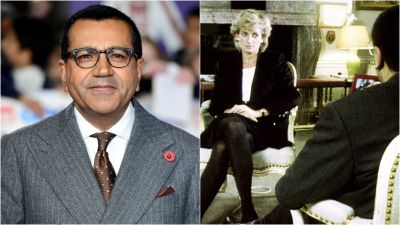BBC to launch review into editorial policies following Lord Dyson report into Diana interview

The BBC said it will review its editorial practices in the wake of Lord Dyson’s inquiry into the 1995 Panorama interview with Diana, Princess of Wales.
The broadcaster's board will launch a review into the effectiveness of its “editorial policies and governance” following the failings set out in the 127-page report, which found the corporation covered up “deceitful behaviour” used by journalist Martin Bashir to secure the interview.
The board added that it hoped to ensure the “mistakes of the past” could not be repeated.
The review will be undertaken by a group of non-executive board directors, led by Sir Nick Serota, senior independent director of the BBC.
It will be supported by Ian Hargreaves and Sir Robbie Gibb, non-executive members of the corporation’s editorial guidelines and standards committee, and will report to the BBC board in September.
The review will look at oversight of editorial practices and assess the robustness and independence of whistleblowing processes at the broadcaster.
It will also identify “lessons to be learned” from Lord Dyson’s review which may be relevant today.
The statement comes after Culture Secretary Oliver Dowden accused the BBC of adopting a “we know best” attitude in the scandal surrounding the Panorama interview.
In his first detailed response since the report from Lord Dyson, Mr Dowden said the affair had exposed “failures that strike at the heart of our national broadcaster’s values and culture”.
Writing in The Times he said far-reaching change was needed to ensure the corporation was in tune with “all parts of the nation it serves”.
The statement from the BBC board read: “We accepted Lord Dyson’s findings in full and reiterate the apology we have offered to all those affected by the failings identified. We recognise the impact that the events it describes has had on so many people, not least those whose lives were personally affected by what happened. We also acknowledge that audiences had a right to expect better from the BBC.
“As a board we believe that the BBC is a different organisation today, with different and stronger governance, as well as improved processes. Nevertheless, Lord Dyson’s report speaks to historic failings of oversight and these should be reflected upon. We must not just assume that mistakes of the past cannot be repeated today – we must make sure that this is the case.”
Listen to our podcast - The Royal Rota
In his report, Lord Dyson, a former master of the rolls, said journalist Martin Bashir used “deceitful conduct” to obtain the 1995 interview which was then covered up by a “woefully ineffective” internal investigation.
Mr Dowden said the BBC’s leadership was too narrowly drawn – succumbing to ”groupthink” – and that “cultural change” was needed in the organisation.
“The BBC can occasionally succumb to a ‘we know best’ attitude that is detached both from the criticism and the values of all parts of the nation it serves,” he said.
“Groupthink in any organisation results in a lack of challenge and poor decision making. That’s why cultural change must be a focus for the director general and new chair.”
Mr Dowden said the BBC needed “to improve its culture to ensure this never happens again and that means a new emphasis on accuracy, impartiality and diversity of opinion”.
His warning came after Home Secretary Priti Patel refused to rule out the prospect of criminal prosecutions after Lord Dyson’s findings.
She told Sky News: “If there is subsequent action that needs to be taken, then clearly… that will follow.”
With the BBC facing a mid-term review of its charter next year, Mr Dowden said the government would not be rushed into “knee jerk reforms”, but it would not “stand idly by”.
Further ahead, he indicated there were “fundamental questions” about the future of the licence fee beyond 2027 as it competes with US streaming giants like Amazon and Netflix.
He suggested the only way the BBC could justify its funding model was by providing distinctively British programmes.
He said it needed to “step up to project British values and distinct quality programming with renewed vigour and ambition as our national champion”.
In the fallout from the Dyson report, former BBC director general Lord Hall – who, as head of news and current affairs, carried out the 1996 internal investigation into the way the Diana interview was obtained – quit at the weekend as chairman of the National Gallery.
MPs are expected to press for answers as to how Bashir was rehired by the BBC in 2016 as religious affairs correspondent – later promoted to religion editor – even though it was known he lied to the internal inquiry.
There have been calls for compensation for BBC “whistleblowers” whose careers suffered after they tried to raise concerns about the way Bashir operated.
Prince William responds to the Dyson report:
He said he was “deeply sorry” to the dukes of Cambridge and Sussex but disputed William’s charge that he fuelled Diana’s isolation and paranoia.
He told the Sunday Times: “I never wanted to harm Diana in any way and I don’t believe we did. Everything we did in terms of the interview was as she wanted.”